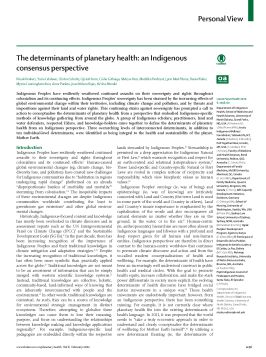The determinants of planetary health: An Indigenous consensus perspective
Advancing planetary health requires Indigenous knowledges
The authors of this article preface their findings by stating that the effects of colonialism and human-caused environmental changes continue to threaten Indigenous sovereignty and Indigenous rights. They contend that essential Indigenous-focused knowledge is often overlooked in discussions related to planetary health. On a related note, they caution that Indigenous knowledges are highly contextual and cannot be easily generalized, globalized or merged with Western scientific knowledge systems.
Disrupting world views that typically dominate health discourse
Importantly, the authors disrupt (Western) individualistic, human-centric and patriarchal world views that currently dominate discussions about the determinants of health and related efforts to address the inequitable climate crisis. They call for equity for all of Earth’s inhabitants; discuss Indigenous leadership in protecting the rights of rivers; and connect capitalist and colonial ideologies to denying the rights of land, water and air. They recognize women as integral to (a) building resilient communities and supportive networks, and (b) protecting cultural identity and the natural environment. Finally, they equate violence against Earth as violence against women, driven by systemic oppression.
Ten determinants of planetary health identified through an Indigenous-led process
An Indigenous-led consensus process consistent with Indigenous research methodology brought together Indigenous scholars, practitioners, land and water defenders, respected Elders, and Knowledge Holders from around the world. The knowledge shared during this process validated that Earth’s health depends on the capacity of humans to understand and value interconnectedness, and what it means to live in sustainable relationship with Earth. Through this process, the authors identified 10 determinants of planetary health across three related levels:
Level 1: Mother Earth-level determinants
- Respect of the feminine
- Ancestral legal personhood designation
Level 2: Interconnecting determinants
- Human interconnectedness within Nature
- Self and community relationships
- The modern scientific paradigm
- Governance and law
Level 3: Indigenous Peoples-level determinants
- Indigenous land tenure rights
- Indigenous languages
- Indigenous Peoples’ health
- Indigenous Elders and children
Use this resource to
- Understand the determinants of planetary health from an Indigenous perspective
- Challenge human-centric framings of health and well-being
- Consider the power dynamics between humans, animals and natural systems
- Consider how ideas related to interconnectedness and living sustainably intersect with traditional public health work
Alignment with NCCDH work:
The NCCDH is interested in promoting understanding and action on the factors that drive health and health inequity. Recognizing the interactions between the structural, social and ecological determinants of health, the NCCDH developed two practice briefs emphasizing the need for urgent public health action to address the climate crisis and planetary health.
Climate change resilience part 2: Public health roles and actions
See other resources related to planetary health.
Reference
Redvers, N., Celidwen, Y., Schultz, C., Horn, O., Githaiga, C., Vera, M., Perdrisat, M., Mad Plume, L., Kobei, D., Cunningham Kain, M., Poelina, A., Rojas, J. N., & Blondin, B. (2022). The determinants of planetary health: An Indigenous consensus perspective. The Lancet Planetary Health, 6(2), e156–e163. https://doi.org/10.1016/S2542-5196(21)00354-5
Tags: Indigenous health, Structural determinants, Planetary health, Academic Institution, Document, Journal Article
